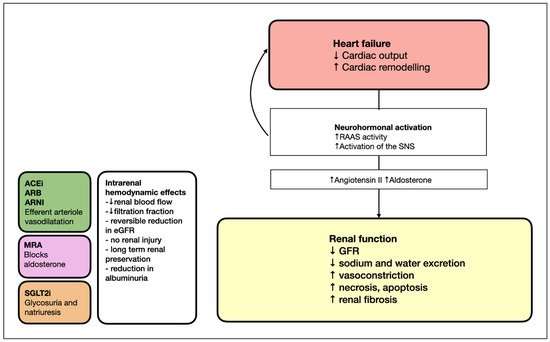Your browser does not fully support modern features. Please upgrade for a smoother experience.
Please note this is a comparison between Version 1 by Sara Schukraft and Version 2 by Conner Chen.
Worsening renal function is associated with poor outcomes in heart failure and often accompanies the initiation and up-titration of guidelines-directed heart failure therapy.
- cardiorenal syndrome
- heart failure
- chronic kidney disease
1. Introduction
Many patients with heart failure (HF) suffer from chronic kidney disease (CKD), which not only worsens prognosis but also complicates guidance of medical HF therapy [1][2][1,2]. Initiation or up-titration of guidelines-directed HF therapy often goes along with a decrease in renal function [3][4][5][6][7][3,4,5,6,7]. This interaction is unpleasant from a clinical point of view; however, HF therapies such as renin–angiotensin–aldosterone system (RAAS) antagonists largely improve the prognosis of HFrEF and slow the progression of renal dysfunction in the medium and long term.
Most pivotal randomized-controlled trials testing drugs for the treatment of HF with reduced ejection fraction (HFrEF) excluded patients with more severe chronic kidney disease (CKD). By consequence, evidence guiding implementation of HF drugs in patients with more severe CKD is limited (Table 1). Therefore, most clinicians are watchful when implementing HF drugs that interact with renal function, and are often inert with respect to increasing the guidelines-recommended drugs to the target dose. Figure 1 illustrates the mechanisms of heart failure and evidence-based treatments for renal function in HFrEF.

Figure 1. Mechanisms of heart failure and evidence-based treatments for renal function in HFrEF. ACEi, angiotensin-converting enzyme inhibitor; ARB, angiotensin II receptor blocker; ARNI, angiotensin receptor blocker–neprilysin inhibitor; GFR, estimated glomerular filtration rate; MRA, mineralocorticoid receptor antagonist; RAAS, renin–angiotensin–aldosterone system; SGLT2i, sodium–glucose cotransporter-2 inhibitor; SNS, sympathetic nervous system.
Table 1. Recommendation of drug dosing in HFrEF in patients without and with CKD, based on available evidence and the SWISS medicinal product licensing body (SWISSMEDIC).
| Drug Class | Medical Therapy | Target Daily Dose in Heart Failure Clinical Trials | Drug Dose Recommendations in Advanced CKD |
|---|---|---|---|
| ACE inhibitors (ACEis) | Enalapril | 20 mg BD | Maximum dose of 5 mg D for enalapril |
| Lisinopril | 50 mg D | Maximum dose of 5 mg D for lisinopril | |
| Captopril | 75 mg BD | Maximum dose of 6.25 mg D for captopril | |
| Angiotensin II Receptor Blockers (ARBs) | Candesartan | 32 mg D | Candesartan untested in eGFR < 15 mL/min |
| Valsartan | 160 mg BD | Valsartan untested in eGFR < 10 mL/min | |
| Angiotensin Receptor–Neprilysin Inhibitor (ARNI) | Sacubritril/Valsartan | 200 mg BD | No adjustment recommended |
| Steroidal Mineralocorticoid receptor Antagonist (MRA) | Spironolactone | 50 mg D | Contraindicated with eGFR < 30 mL/min |
| Eplerenone | 50 mg D | Contraindicated with eGFR < 30 mL/min | |
| Nonsteroidal Mineralocorticoid Antagonist | Finerenon | 10 mg D | Not recommended with eGFR < 25 mL/min |
| Beta-blockers | Carvedilol | 50 mg BD | No adjustment recommended for carvedilol, cardvedilol, or bisoprolol |
| Bisoprolol | 10 mg D | ||
| Metoprolol | 200 mg D | ||
| Sodium–glucose cotransporter-2 inhibitor (SGLT2i) | Dapaglifozin | 10 mg D | No adjustment recommended |
| Empaglifozin | 10 mg D | Not recommended with eGFR < 20 mL/min (results of the EMPA-Kidney pending) | |
| Practice guidelines recommend up-titration of evidence-based medications at trial doses for all HF patients, as tolerated. Close monitoring of blood pressure, serum potassium and kidney function is recommended | |||
ACEi, angiotensin-converting enzyme inhibitor; ARB, angiotensin II receptor blocker; ARNI, angiotensin receptor blocker–neprilysin inhibitor; BD, twice a day; CKD, chronic kidney disease; D, daily; eGFR, estimated glomerular filtration rate; MRA, mineralocorticoid receptor antagonist; SGLT2i, sodium–glucose cotransporter-2 inhibitor.
